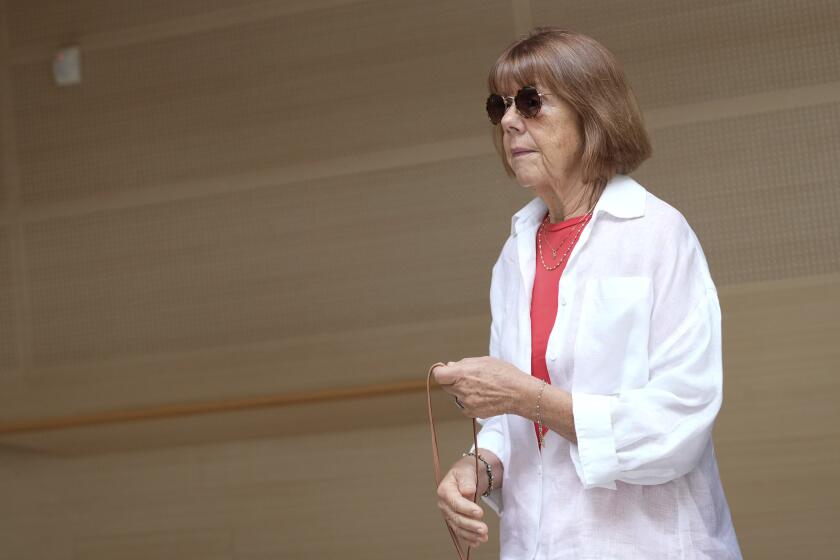Arab Anger Over Fallouja Assault Muted
As U.S. troops push into Fallouja, the Arab world is watching with concern -- fearing a repeat of the high number of civilian casualties that accompanied an aborted attempt in April to take control of the city.
So far there seems to be little of the rage directed toward previous U.S.-led offensives.
Clerics in Saudi Arabia said the insurgents who controlled the Sunni Muslim city were justified in resisting U.S. forces, and Arab League Secretary-General Amr Moussa said he hoped the operation would end quickly.
Al Jazeera television, based in Qatar, quoted an Iraqi journalist, Fadel Badrani, as saying about half of Fallouja’s 120 mosques had been destroyed by in U.S. tanks and airstrikes.
But there is less sympathy than in April for the militants -- especially foreign fighters -- who have engaged in a wave of kidnappings for the last six months.
“The reaction is limited -- very limited,” said Jaafar El-Ahmar, a Lebanese journalist and Iraq expert for Al Hayat newspaper in London. “The fact that there are no accounts of casualties among civilians is minimizing the reaction of Arabs and the Muslim world. And secondly, I think there is a sort of anger towards those insurgents who are defying the people of Fallouja.
“Now the whole world knows that there are those who came from abroad and embedded themselves inside Fallouja, so this creates an atmosphere against them.”
Since the fighting began Monday night, limited access for the news media has meant that few images of dead or wounded civilians have appeared on Arab television channels. Such images have stoked rage in the past.
The Arab media reported expectations that U.S. forces would take control of Fallouja in due course, and indicated there was little chance that the insurgents would stand and fight or that the battle would prove decisive for Iraq.
“Fallouja fighters stand no chance in defeating the strongest army in history,” said Lebanese newspaper As Safir.
Still, the prevailing mood was less than a ringing endorsement for the U.S. push into the Sunni militant hotbed, with many Arabs believing that dialogue rather than force would be the better way of dealing with opponents of the U.S.-backed interim government.
“Beside the human catastrophe in making Fallouja a ghost city, one should wonder at this point whether there is any difference between what the U.S. forces claim to stand for and what former President Saddam Hussein stood for,” said a commentary in Qatar’s Al-Watan newspaper.
Noting that interim Iraqi Prime Minister Iyad Allawi had invoked emergency laws for the next 60 days leading up to planned elections in January, Lebanon’s An Nahar newspaper said it was a “contradiction” that “the Iraqi march to democracy ... has begun with a state of emergency.”
“If the Iraqi interim leader really wants to restore security, he should have improved the humanitarian and political situation and made tolerance his slogan,” said the London-based Arabic newspaper Al-Arab al-Alamiyah.
Jordan’s Al Dustur newspaper suggests that the U.S. decision to retake Fallouja was inevitable, and that this time there would be no stopping it.
“The Iraqi government has finally taken the painful decision to wage a total war to recover the cities.... This is surely because it cannot afford to engage itself in a half-battle, nor compromise itself by starting negotiations in the middle of the attack,” its editorial said.
Anti-U.S. sentiment remains strong across the region, nevertheless, with some extreme groups openly supporting Fallouja insurgents.
In a fatwa, or religious edict, posted Saturday on the Internet, 26 prominent Saudi clerics said that resisting the Americans in Iraq was a religious duty for Iraqis.
“Resistance is a legitimate right. A Muslim must not inflict harm on any resistance man or inform on them. Instead, they should be supported and protected,” the posting said.
On the streets of other Arab capitals, a sense of resignation appeared to prevail after opposition to American actions in Iraq since early 2003 yielded no result.
“Forget the Arab people and the Arab street. The war’s over,” said Muhammad Kamal Samal, 24, an Egyptian working in a flower shop in Amman, Jordan. “Even if they’re angry, what will it produce?”
In Cairo, however, textbook publisher Hossam Sharaf, 30, countered, “The Iraqis are real men and they do the unexpected. Look at the beheadings. They are horrible, but they are scaring the Americans.”
Moussa, the former Egyptian foreign minister who leads the Arab League, told reporters he worried mainly about civilian casualties in the Fallouja action, which he termed “regrettable.”
Egypt is to act as host to an international conference on rebuilding Iraq, scheduled for Nov. 22-23 in Sharm el-Sheik, and officials hope the fighting will have concluded by then so that bloodshed will not cast a shadow over the meeting.
*
Times staff writer Ashraf Khalil in Amman, Jordan, Hossam Hamalawy in The Times’ Cairo Bureau, and special correspondent Rania Abouzeid in Beirut contributed to this report.
More to Read
Sign up for Essential California
The most important California stories and recommendations in your inbox every morning.
You may occasionally receive promotional content from the Los Angeles Times.










